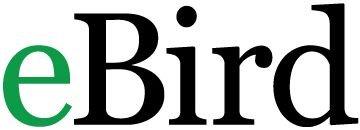Nature Observation
Projects and Tools
If you'd like to record your observations online and make them available for use by researchers and scientists around the world, give one of these free tools and projects a try:
A free platform from the Cornell Lab of Ornithology for recording, sharing, and exploring bird observations from around the world. See also some of their articles:
- Online resources to enjoy birds from your home
- Discover the birds in your yard or garden
- How To Make These Next Few Weeks A Little Easier, Courtesy Of Birds
Give eBird a try - you'll be surprised to learn how many species of birds have been seen in Boston.
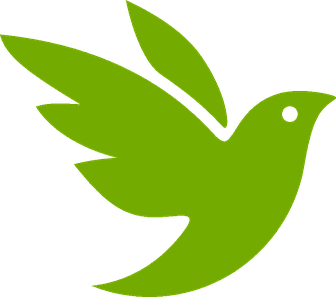 iNaturalist is like eBird, but has much larger ambitions - it seeks to record 'research-quality' observations of any and all living things. They too have helpfully provided a list of activities for which their platform can be used even if one is remaining in one's home.
iNaturalist is like eBird, but has much larger ambitions - it seeks to record 'research-quality' observations of any and all living things. They too have helpfully provided a list of activities for which their platform can be used even if one is remaining in one's home.
One of the most interesting of these is the Never Home Alone project, devoted to discovering and identifying the (nonhuman) life forms that live alongside us in our homes - see the associated book in the Urban and Domestic tab at right.
 The National Phenology Network (USA-NPN) is a group of citizen scientists, government agencies, non-profit groups, educators and students devoted to observing, recording, and studying phenology, the timing of life history events in animals and plants - things like first leafing and flowering in trees, bird migration and nesting, and active periods of insects.
The National Phenology Network (USA-NPN) is a group of citizen scientists, government agencies, non-profit groups, educators and students devoted to observing, recording, and studying phenology, the timing of life history events in animals and plants - things like first leafing and flowering in trees, bird migration and nesting, and active periods of insects.
Their main citizen science tool is Nature's Notebook, a free online platform for recording and organizing your phenological observations in a way that makes them usable for scientists and other researchers.
You can choose to record observations for any of the species on the platform's species list, or you can join one of the ongoing campaigns.
Related Guides
Field and Identification Guides
Local and Regional Bird Guides
These guides will help you identify the birds you're likely to see in Boston, Massachusetts, and New England.
Whether you're obsessed with raptors, warblers, or sandpipers, confused by the plumage stages of gulls, or seeking out rare sightings, there are specialized bird guides to help.
Bird Identification: Methods and Practices
These guides will help you learn mental habits and practical techniques to confidently identify the birds you see.
-
Peterson Field Guide to Mammals of North America by Fiona Reid
Publication Date: 2006The most comprehensive, in-depth, and current guide to North American mammals, this book covers all the mammals found in North America north of Mexico, including those that live in near-shore waters. The only guide to include paintings and photographs of the animals as well as photographs of mammal skulls, it has 80 color plates, plus 46 additional color illustrations and black-and-white drawings, nearly 400 range maps, and more than 100 color photographs. -
Mammals of North America by Roland W. Kays; Don E. Wilson
Publication Date: 2009Covering 20 species recognized since 2002 and including 13 new color plates, this fully revised edition of Mammals of North America illustrates all 462 known mammal species in the United States and Canada--each in beautiful color and accurate detail.
-
Peterson Field Guide to Reptiles and Amphibians of Eastern and Central North America, Fourth Edition by Robert Powell; Roger Conant; Joseph T. Collins
Publication Date: 2016The new edition of this definitive guide reflects 25 years' worth of changes in our knowledge of reptiles and amphibians. Color illustrations and drawings show key details for accurate identification. More than 100 color photographs and 322 color distribution maps accompany the species descriptions. Clear and concise species accounts provide key characteristics, similar species, habitats, and ranges, as well as subspecies, voice descriptions, and conservation status. -
Snakes of the Eastern United States by Whit Gibbons
Publication Date: 2017More than sixty species of snakes are found in the eastern United States, the region of highest biodiversity of all reptiles and amphibians in North America. In this brand new guide, stunning photographs, colorful geographic range maps, and comprehensive written accounts provide essential information about each species--including detailed identification characteristics, general ecology and behavior, and conservation status. Carefully researched and written, the guide is directed toward a general audience interested in natural history.
-
National Audubon Society Field Guide to Fishes by National Audubon Society
Publication Date: 2002Covering both freshwater and saltwater species of fish, this fully revised edition brings a new level of accuracy and usefulness to the National Audubon Society's acclaimed field guides. With 700 new full-color photographs, 286 black-and-white illustrations, and 637 maps, this is the most comprehensive field guide available to the fishes of North America. -
Freshwater Fish of the Northeast by Matt Patterson (Illustrator); David A. Patterson (Text by)
Publication Date: 2010Describes more than 60 different species, from the well known to the obscure, including the redfin pickerel, the blueback trout, and the slimy sculpin. This colorful and helpful guide includes detailed information on habits, habitats, history, and more. -
Fishes of the Sea by John N. Lythgoe; Gillian Lythgoe; Planet Earth Staff (Photographer)
Publication Date: 1991This is a photographic and descriptive guide to the fish species that inhabit the North Atlantic and Mediterranean. The fish are arranged by class, family and species, and succinct descriptions give detailed information about anatomy, distribution, food and breeding habits.
-
Mushrooms of Northeast North America by George Barron
Publication Date: 1999A full-color photographic field guide to mushrooms and fungi of the northern United States, from the Midwest to New England. -
North American Mushrooms by Orson K. Miller; Hope H. Miller
Publication Date: 2006A field guide to more than 600 edible and inedible mushrooms that can be found across the United States and Canada. -
Mushrooms and Other Fungi of North America by Roger Phillips
Publication Date: 2010"For amateur collectors or professional mycologists working in the field, this guidebook is quite simply the best North American mushroom reference ever published. Each of the 1,000 specimens is shown in full color on a neutral background to eliminate distractions, and specimens are arranged to show the cap, stem, gills, spines and a cross section, usually in various stages of growth."
-
Wild Urban Plants of the Northeast by Peter Del Tredici
Publication Date: 2020The perfect guide for exploring the plant life of the city of Boston. -
Identifying Trees of the East: An All-season Guide to Eastern North America by Michael D. Williams
Publication Date: 2017All-season field guide for identifying common trees of eastern NA This popular, field-tested guide for identifying trees in any season, not just when they are in full leaf, features 600 color photos and 200 line drawings showing bark, branching patterns, fruits, flowers, nuts, and overall appearance in addition to leaf color and shape. Accompanying text describes common locations and identifying characteristics. -
Trees of Eastern North America by Gil Nelson; Christopher J. Earle; Richard Spellenberg; Amy K. Hughes (Editor); David More (Illustrator)
Publication Date: 2014The most comprehensive and user-friendly field guide to the trees of eastern North America. Covering 825 species, more than any comparable field guide, Trees of Eastern North America is the most comprehensive, best illustrated, and easiest-to-use book of its kind. -
Wildflowers of New England by Ted Elliman
Publication Date: 2016A compact, beautifully illustrated guide packed with descriptions and photographs of thousands of the region's most important wildflowers. -
Mosses, Liverworts, and Hornworts: a Field Guide to Common Bryophytes of the Northeast by Ralph H. Pope
Publication Date: 2016This photo-based field guide to the more common or distinctive bryophytes of northeastern North America gives beginners the tools they need to identify most specimens without using a compound microscope. -
Mosses of the Northern Forest by Jerry Jenkins
Publication Date: 2020With multi-image composite photos that allow for unparalleled depth and clarity, this unique guide illustrates the myriad varied and beautiful--and often overlooked--mosses of the Northern Forest.
-
Insects of New England and New York by Tom Murray
Publication Date: 2012Natural history and identification tips on over 1,000 species of insects, and including hundreds of color photos. -
Spiders of the North Woods, Second Edition by Larry Weber
Publication Date: 2013The closest thing we have to an accessible localized guide to spiders for this region. -
Dragonflies and Damselflies of the East by Dennis Paulson
Publication Date: 2012This is the first fully illustrated guide to all 336 dragonfly and damselfly species of eastern North America. -
Dragonflies Through Binoculars by Sidney W. Dunkle
Publication Date: 2000Binoculars can be used for watching more than birds, as this guide demonstrates. -
Peterson Field Guide to Moths of Northeastern North America by David Beadle; Seabrooke Leckie
Publication Date: 2012A guide to more than 1,500 species of moths that can be found in the northeast section of North America, which includes photographs and tips on how to set up a moth trap, range maps, graphs showing when each species is in flight, and more. -
Butterflies of North America by Jim P. Brock
Publication Date: 2003This innovative field guide is detailed enough to be valuable for experts, while the layout is designed for ease of use even by beginners. The pictorial table of contents and quick one-page index lead the user rapidly to the correct section of the book. The text is clear and informative, and the illustrations are the most comprehensive of those in any such guide, with more than 2,300 butterflies in natural postures. -
Butterflies of North America by Jeffrey Glassberg
Publication Date: 2011This user-friendly guide, lavishly illustrated with more than 160 species, provides invaluable information for those who want identify almost any North American butterfly, create a butterfly-friendly garden, use the new breed of close-range binoculars, and protect butterfly environments. -
The Bees in Your Backyard by Joseph S. Wilson; Olivia Messinger Carril
Publication Date: 2015Provides an engaging introduction to the roughly 4,000 different bee species found in the United States and Canada, dispelling common myths about bees while offering essential tips for telling them apart in the field. The book features more than 900 stunning color photos of the bees living all around us and describes their natural history, including where they live, how they gather food, their role as pollinators, and even how to attract them to your own backyard. -
Bumble Bees of North America: An Identification Guide by Paul H. Williams; Robbin W. Thorp; Leif L. Richardson; Sheila R. Colla
Publication Date: 2014Richly illustrated with color photographs, diagrams, range maps, and graphs of seasonal activity patterns, this guide allows amateur and professional naturalists to identify all 46 bumble bee species found north of Mexico and to understand their ecology and changing geographic distributions. -
A Field Guide to the Ants of New England by Aaron M. Ellison; Nicholas J. Gotelli; Elizabeth J. Farnsworth; Gary D. Alpert
Publication Date: 2012Illustrated with more than 500 line drawings, 300-plus photographs, and regional distribution maps as composite illustrations for every species, this guide will introduce amateur and professional naturalists and biologists, teachers and students, and environmental managers and pest-control professionals to more than 140 ant species found in the northeastern United States and eastern Canada. -
Ants of North America by Brian L. Fisher; Stefan P. Cover
Publication Date: 2007This concise, easy-to-use, authoritative identification guide introduces the fascinating and diverse ant fauna of the United States and Canada. It features the first illustrated key to North American ant genera, discusses distribution patterns, explores ant ecology and natural history, and includes a list of all currently recognized ant species in this large region. -
Seashells of New England by Sandy Allison; David Scheirer (Drawings)
Publication Date: 2017Beautiful illustrations and straightforward descriptive text help readers identify 70 different seashells.
-
Kaufman Field Guide to Nature of New England by Kenn Kaufman; Kimberly Kaufman
Publication Date: 2012With authoritative and broad coverage, using nontechnical and lively language and more than 2,000 color photographs, this guide is an essential reference for nature lovers living in or visiting New England. -
Peterson Field Guide to Eastern Forests by John C. Kricher (photographer); Gordon Morrison (Illustrator); Roger Tory Peterson (Editor)
Publication Date: 1998This field guide includes all the flora and fauna you're most likely to see in the forests of eastern North America. With 53 full-color plates and 80 color photos illustrating trees, birds, mammals, wildflowers, mushrooms, reptiles, amphibians, butterflies, moths, beetles, and other insects. -
A Photographic Guide to Seashore Life in the North Atlantic by J. Duane Sept
Publication Date: 2008With some 300 crisp, vibrant color photographs and brief, precise descriptions, this field guide makes it easier than ever to identify Atlantic seashore life from Canada to Cape Cod. -
Field Guide to the New England Alpine Summits by Nancy G. Slack; Allison W. Bell
Publication Date: 2014With 350 full-color photographs, an easy-to-reference flowering chart, and expert advice, this guide helps you identify the plants, birds, insects, amphibians, and mammals of the alpine zone. -
A Field Guide to Cape Cod by Patrick J. Lynch
Publication Date: 2019A richly illustrated full-color guide to the unique plants, wildlife, and environments of Cape Cod and the other nearby "Outer Lands" that face the Atlantic Ocean.
Motives, Methods, and Milieus
The physical and mental health benefits of spending time in contact with nature, especially in urban areas, are nicely summarized in this 2018 report from the USDA Forest Service:
See also:
-
The Nature Fix: Why Nature Makes Us Happier, Healthier, and More Creative by Florence Williams
ISBN: 9780393242720Publication Date: 2017"Florence Williams investigates the science behind nature's positive effects on the brain. Delving into brand-new research, she uncovers the powers of the natural world to improve health, promote reflection and innovation, and strengthen our relationships. As our modern lives shift dramatically indoors, these ideas--and the answers they yield--are more urgent than ever." Available online through Overdrive.
Observation can seem simple enough, but sometimes learning more about how to look, what to look for, and how to document what you see can make for a more rewarding experience.
-
Naturally Curious Day by Day by Mary Holland
Publication Date: 2016This account of nature observations in eastern North America throughout the year covers signs of animal activity, landmarks in animal and plant life cycles, and seasonal animal behaviors. It provides both valuable information about what types of signs and phenomena to look for and inspiration to go out and make one's own observations at any time of year. Available online through Hoopla. -
Seeing Trees by Nancy Ross Hugo; Robert Llewellyn (Photographer)
Publication Date: 2011This remarkable book is not so much about identifying trees as it is about learning how to look at them, closely and patiently, and discover and appreciate the incredible structures and phenomena they exhibit. From twigs, leaf scars and bark to buds, leaves, and flowers, this informative book and its excellent photographs will help you see and appreciate trees in a whole new way. -
Identifying Animal Tracks by Richard Headstrom
Publication Date: 2012This book, which grew out of an article the author published in the Bulletin of the Massachusetts Audubon Society, features the tracks of not only mammals but also birds, frogs, toads, salamanders, snakes, lizards, turtles, insects, and other invertebrates, all common to the eastern United States. Available online through Hoopla. -
The Laws Guide to Nature Drawing and Journaling by John Muir Laws
Publication Date: 2016"The ultimate guide to nature drawing and journaling! A potent combination of art, science, and boundless enthusiasm, the latest art instruction book from John Muir Laws is a how-to guide for becoming a better artist and a more attentive naturalist...While the book's advice will improve the skills of already accomplished artists, the emphasis on seeing, learning, and feeling will make this book valuable--even revelatory--to anyone interested in the natural world, no matter how rudimentary their artistic abilities." Available online through Hoopla.
Just because we live in an urban environment doesn't mean there isn't still plenty of other life to observe. Try one of the eBooks below for insight and inspiration for observing life in the city or even within your own home.
-
Unseen City by Nathanael Johnson
Publication Date: 2016Johnson shares facts about the nonhumans with whom he shared his urban home, but more importantly, he advises us to slow down and practice a new way of looking at the world that is more attentive to the other living things that are always around us, no matter how sterile our environments may seem. -
The Urban Naturalist by Steven D. Garber
Publication Date: 1987Be not deceived by the age of this book - many of the plant and animal habits it describes will have changed little if at all since it was written. "This informative, useful field guide reveals the amazing biodiversity within city and suburban landscapes, including trees, insects and other invertebrates, fish, amphibians, reptiles, birds, and mammals. The author explains why these organisms live in cities and how they survive, offers tips on which species to look for, and shares hundreds of fascinating facts." -
Never Home Alone: From Microbes to Millipedes, Camel Crickets, and Honeybees, the Natural History of Where We Live by Rob Dunn
Publication Date: 2018"In Never Home Alone, biologist Rob Dunn introduces us to the nearly 200,000 species living with us in our own homes, from the Egyptian meal moths in our cupboards and camel crickets in our basements to the Lactobacillus lounging on our kitchen counters." See the iNaturalist link in the box to the left for the author's associated citizen science project to gather observations of domestic wildlife. -
Darwin Comes to Town: How the Urban Jungle Drives Evolution by Menno Schilthuizen
Publication Date: 2018A global exploration of how urban environments are causing sometimes rapid evolutionary change in the populations of nonhuman animals that inhabit them.
Online Identification Guides
Plants
-
Identifying Trees of the East by Michael D. Williams
Publication Date: 2017"This popular, field-tested guide for identifying trees in any season, not just when they are in full leaf, features 600 color photos and 200 line drawings showing bark, branching patterns, fruits, flowers, nuts, and overall appearance in addition to leaf color and shape. Accompanying text describes common locations and identifying characteristics. Covers every common tree in eastern North America, updated with the latest taxonomy and 130 range maps. Created for in-the-field or at-home use, this helpful guide includes an easy-to-use key to facilitate putting a name to a tree." Available through Hoopla. -
Wildflowers of New England by Ted Elliman; New England New England Wild Flower Society
Publication Date: 2016"Descriptions and photographs of thousands of the region's most important wildflowers. It includes annuals, perennials, and biennials, both native and naturalized." Available through OverDrive. -
Field Guide to the Grasses, Sedges, and Rushes of the United States by Edward Knobel
Publication Date: 1977"Clear descriptions and accurate drawings to differentiate over 370 of the most common species: timothy, rye, foxtail, fescue, bluegrass, many more. Key. 600 line drawings. Updated nomenclature by Mildred F. Faust."
Available through Hoopla. -
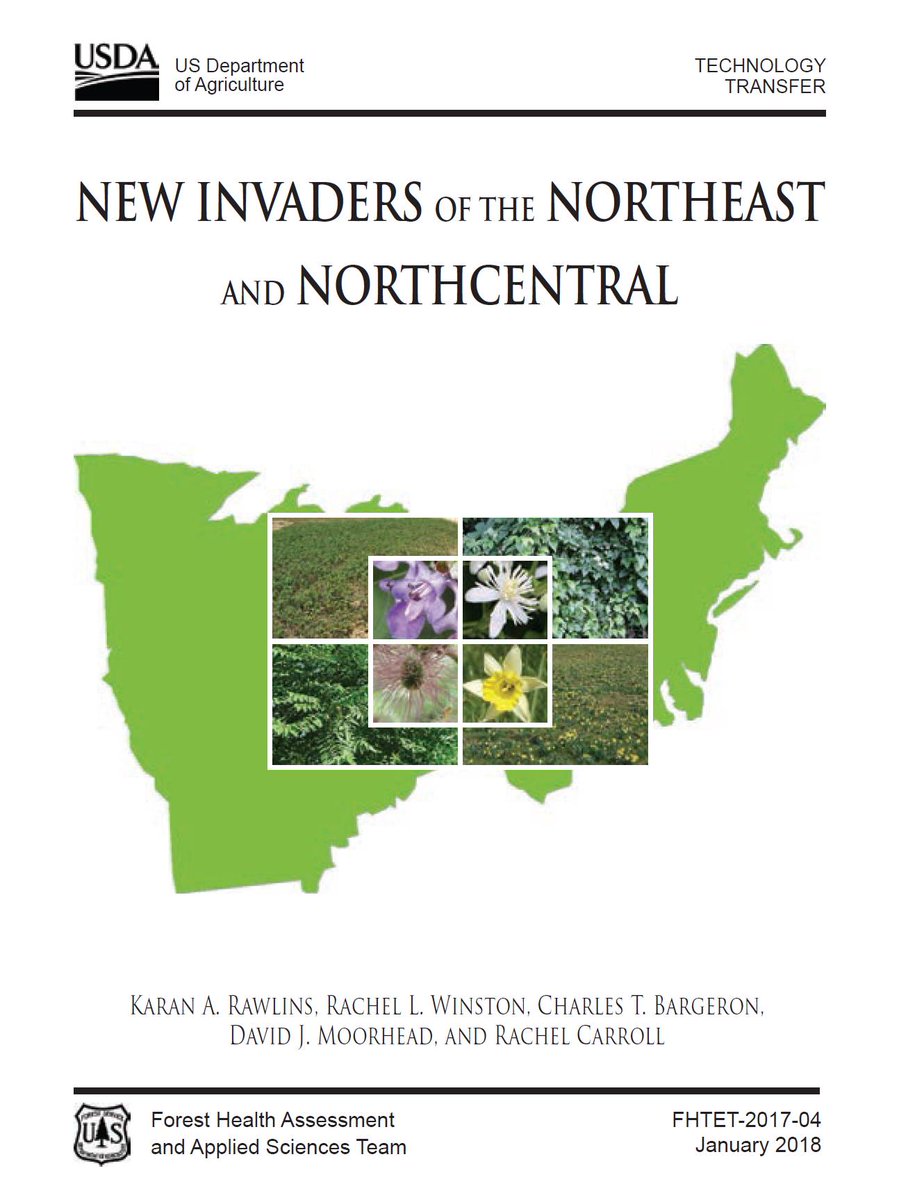 New Invaders of the Northeast and Northcentral United States
by
Karan A. Rawlins et al.
Publication Date: 2018A guide to recognizing recently arrived invasive plants in our region. A publication of the US Department of Agriculture.
New Invaders of the Northeast and Northcentral United States
by
Karan A. Rawlins et al.
Publication Date: 2018A guide to recognizing recently arrived invasive plants in our region. A publication of the US Department of Agriculture.
Fungi
-
Mushrooms of the Northeast by Teresa Marrone; Walt Sturgeon
Publication Date: 2016"Hundreds of full-color photos with easy-to-understand text make this a great visual guide to learning about more than 400 species of common wild mushrooms found in the Northeast. The species (from Morel Mushrooms to Shelf Mushrooms) are organized by shape, then by color, so you can identify them by their visual characteristics." An accessible guide, available online through Hoopla.
General
-
Garden Insects of North America by Whitney Cranshaw; David Shetlar
Publication Date: 2017"The most comprehensive guide to the common insects, mites, and other "bugs" found in the backyards and gardens of the United States and Canada, featuring 3,300 full-color photos and concise, detailed text. Designed to help you easily identify what you find in the garden, the book is organized by where insects are most likely to be seen--on leaves, shoots, flowers, roots, or soil." Available through Credo Reference. -
 BugGuide
BugGuide is an online community of arthropod enthustiasts hosted by Iowa State's Department of Entomology. It includes photographic collections, identification guides and assistance, and references to further information sources.
BugGuide
BugGuide is an online community of arthropod enthustiasts hosted by Iowa State's Department of Entomology. It includes photographic collections, identification guides and assistance, and references to further information sources. -
 Field Guide for the Biological Control of Weeds in Eastern North America
by
Rachel Winston
Publication Date: 2017This fascinating guide identifies the wide variety of insects that feed on, raise young within, or otherwise contribute to the control of selected eastern weeds.
Field Guide for the Biological Control of Weeds in Eastern North America
by
Rachel Winston
Publication Date: 2017This fascinating guide identifies the wide variety of insects that feed on, raise young within, or otherwise contribute to the control of selected eastern weeds.
Butterflies
-
A Swift Guide to Butterflies of North America by Jeffrey Glassberg
Publication Date: 2017From the publisher: "A revised second edition of the most comprehensive photographic field guide to North American butterflies, featuring more than 500 new photos and updated text, maps, and species names Written by the pioneering authority on the field identification of butterflies and beautifully illustrated with 3,500 color photographs that show all known species, including views of topsides and undersides, males and females, and variants for most species."
Available through Credo Reference.
Dragonflies and Damselflies
-
A Field Guide to the Dragonflies and Damselflies of Massachusetts by Blair Nikula et al.
Publication Date: 2003A photographic guide to the observation and identification of 166 species of dragonflies and damselflies in Massachusetts. A publication of the Massachusetts Division of Fishers and Wildlife, and available online through the Internet Archive.
Bees
-
Bee Basics: An Introduction to Our Native Bees by Beatriz Moisset; Stephen Buchmann
Publication Date: 2016A beautifully illustrated introduction to the major groups of bees native to the United States. A publication of the United States Department of Agriculture and the Pollinator Partnership. -
The Bees in Your Backyard: A Guide to North America's Bees by Joseph S. Wilson; Olivia Messinger Carril
Publication Date: 2015A highly detailed but still accessible guide to the identification, physiology, behavior, and life histories of North American bees. Available online through Credo Reference. -
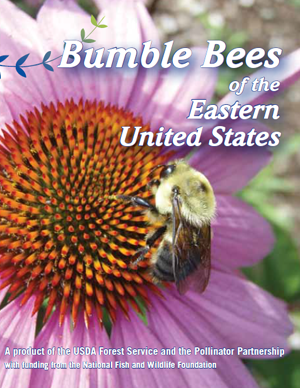 Bumble Bees of the Eastern United States
by
Sheila Colla et al.
Publication Date: 2011A nicely illustrated guide to ranges, physical features, phenology, and identification of bumble bees of the eastern U.S. A publication of the USDA Forest Service and the Pollinator Partnership.
Bumble Bees of the Eastern United States
by
Sheila Colla et al.
Publication Date: 2011A nicely illustrated guide to ranges, physical features, phenology, and identification of bumble bees of the eastern U.S. A publication of the USDA Forest Service and the Pollinator Partnership. -
Bumble Bees of North America by Sheila R. Colla at al.
ISBN: 9780691152226Publication Date: 2014A much more detailed guide to identification of bumble bees of North America north of Mexico. Available online through Credo Reference.
-
Northeastern Birds: Backyard Guide by Bill Thompson
Publication Date: 2013From the former editor of Bird Watcher's Digest, this guide will help you identify the most common species of birds encountered in New England and New York. Available online through Hoopla. -
Warblers and Other Songbirds of North America: A Life-size Guide to Every Species by Paul Sterry
ISBN: 9780062446817Publication Date: 2017The 'life-size' aspect may not hold up for the electronic version, but this is a detailed and useful guide to 285 species of warblers and songbirds that can often be particularly challenging to identify.
-
 Field Guide to the Amphibians of Massachusetts
by
Massachusetts Division of Fisheries and Wildlife
Publication Date: 2013Published as vol. 63, no. 2 of Massachusetts Wildlife, and available online through the State Library of Massachusetts.
Field Guide to the Amphibians of Massachusetts
by
Massachusetts Division of Fisheries and Wildlife
Publication Date: 2013Published as vol. 63, no. 2 of Massachusetts Wildlife, and available online through the State Library of Massachusetts. -
 Snakes of Massachusetts
by
UMass Amherst Center for Agriculture, Food, and the Environment
Publication Date: 2014A website including species accounts, an identification key, and general life history information covering the snake species found in Massachusetts.
Snakes of Massachusetts
by
UMass Amherst Center for Agriculture, Food, and the Environment
Publication Date: 2014A website including species accounts, an identification key, and general life history information covering the snake species found in Massachusetts. -
Handbook Of Larval Amphibians Of The United States And Canada by Ronald Altig, Roy W. McDiarmid
Publication Date: 2015"This generously illustrated handbook for herpetologists, ecologists, and naturalists features comprehensive keys to eggs, embryos, salamander larvae, and tadpoles; species accounts; a glossary of terms; and an extensive bibliography."
-
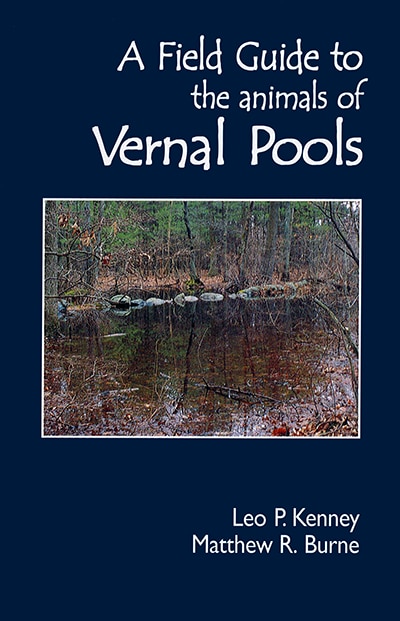 Field Guide to the Animals of Vernal Pools
by
Leo P. Kenney; Matthew R. Burne
Publication Date: 2000Identifies and describes the amphibians, reptiles, and invertebrates that live in or frequent these unique and critical habitats. A publication of the Massachusetts Division of Fisheries and Wildlife, available online through the Internet Archive.
Field Guide to the Animals of Vernal Pools
by
Leo P. Kenney; Matthew R. Burne
Publication Date: 2000Identifies and describes the amphibians, reptiles, and invertebrates that live in or frequent these unique and critical habitats. A publication of the Massachusetts Division of Fisheries and Wildlife, available online through the Internet Archive. -
Fishes: A Guide to Their Diversity by Philip A. Hastings; H. J. Walker; Grantly R. Galland
Publication Date: 2015"A guide to the basic anatomy and diversity of all 82 orders of fishes and more than 150 of the most commonly encountered families, focusing on their distinctive features. Gives a broad overview of fish morphology arranged in a modern classification system for students, fisheries scientists, marine biologists, vertebrate zoologists, and everyday naturalists." Available online through Credo Reference. -
Guide to Seashells of the World by A.P.H. Oliver
Publication Date: 2004"An easy-to-use identification guide to a wide range of shells from all over the world, from the common to the rare and coveted." Available online through Credo Reference.
- Last Updated: Aug 21, 2023 3:57 PM
- URL: https://guides.bpl.org/nature
- Print Page
